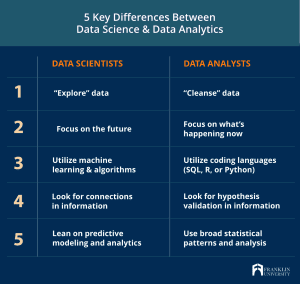Data Analyst vs. Data Scientist: The Ultimate Comparison

Data Analyst vs. Data Scientist: The Ultimate Comparison
August 12, 2024 Comments Off on Data Analyst vs. Data Scientist: The Ultimate ComparisonData Analyst vs. Data Scientist: The Ultimate Comparison.
Here’s a detailed comparison of Data Analysts and Data Scientists, highlighting their roles, skills, tools, and typical career paths:
1. Role and Responsibilities
Data Analyst:
- Focus: Interpreting data to provide actionable insights for business decisions.
- Responsibilities:
- Analyzing historical data to identify trends.
- Creating data visualizations and dashboards.
- Generating reports for stakeholders.
- Performing statistical analysis and data cleaning.
- Focus: Utilizing advanced analytics and machine learning to extract deeper insights and predict future trends.
- Responsibilities:
- Developing predictive models and algorithms.
- Conducting experiments and A/B testing.
- Performing complex statistical analyses.
- Working with large datasets and unstructured data.
2. Skills Required
Data Analyst:
- Technical Skills:
- Proficient in SQL for data querying.
- Experience with data visualization tools like Tableau or Power BI.
- Strong Excel skills for data manipulation.
- Basic understanding of statistics.
- Soft Skills:
- Strong communication skills to present findings.
- Analytical thinking to interpret data trends.
- Technical Skills:
- Proficiency in programming languages such as Python or R.
- Knowledge of machine learning algorithms and libraries (e.g., scikit-learn, TensorFlow).
- Experience with big data technologies (e.g., Hadoop, Spark).
- Advanced statistical analysis and data manipulation skills.
- Soft Skills:
- Critical thinking to solve complex problems.
- Creativity to develop innovative data solutions.
3. Tools and Technologies
Data Analyst:
- Common Tools:
- SQL databases (MySQL, PostgreSQL).
- Data visualization tools (Tableau, Power BI).
- Spreadsheet software (Excel, Google Sheets).
- Common Tools:
- Programming environments (Jupyter Notebook, RStudio).
- Data manipulation libraries (Pandas, NumPy).
- Machine learning frameworks (TensorFlow, PyTorch).
- Cloud platforms (AWS, Google Cloud).
4. Education and Background
Data Analyst:
- Education: Typically requires a bachelor’s degree in fields like Mathematics, Statistics, Computer Science, or Business.
- Experience: Entry-level roles are common; experience in data analytics can be gained through internships or related positions.
Data Scientist:
- Education: Often requires an advanced degree (Master’s or Ph.D.) in Data Science, Statistics, Computer Science, or a related field.
- Experience: Usually seeks candidates with prior experience in data analysis or related fields, along with a strong portfolio of projects.
5. Career Path and Opportunities
Data Analyst:
- Career Progression: Can advance to roles like Senior Data Analyst, Business Intelligence Analyst, or Data Analytics Manager.
- Industry Demand: High demand across various sectors such as finance, healthcare, and marketing.
Data Scientist:
- Career Progression: Can move into senior roles like Data Science Manager, Machine Learning Engineer, or Chief Data Officer.
- Industry Demand: Very high demand, especially in tech, finance, and any data-driven industries.
Infographic
Conclusion
While both data analysts and data scientists work with data, their roles, skill sets, and focus areas differ significantly. If you’re interested in generating actionable insights from data and visualizing trends, a career as a Data Analyst might be suitable. However, if you’re keen on predictive modeling and advanced analytics, pursuing a Data Scientist role may be the right path. Each position has its unique challenges and rewards, so your choice should align with your interests and career goals!
Overall if you solving problems, and need to actually understand data, then a career in Data Science or Data Analysis is for you! Thus with School of IT, you can become a internationally recognized and accredited after completing a data science course in under 3 to 6 months!



